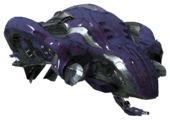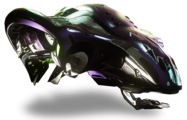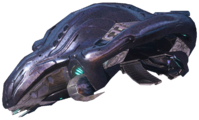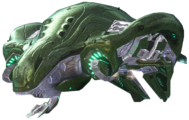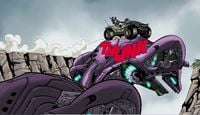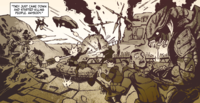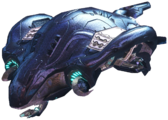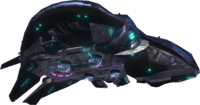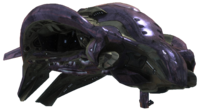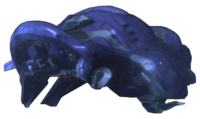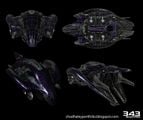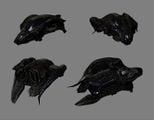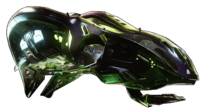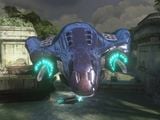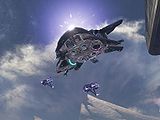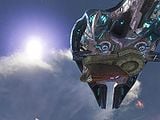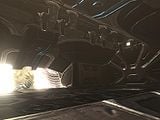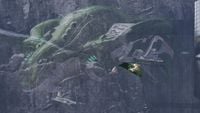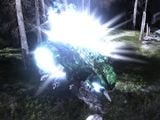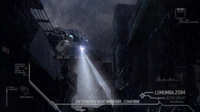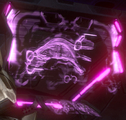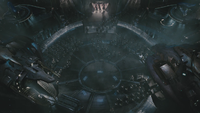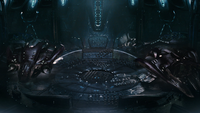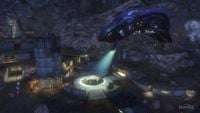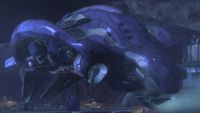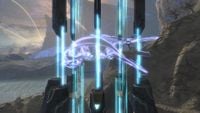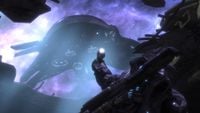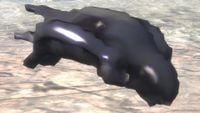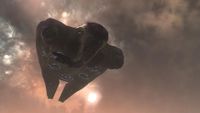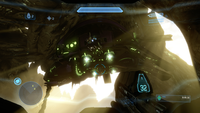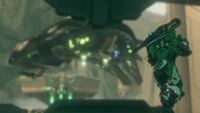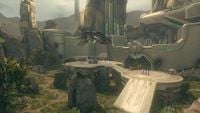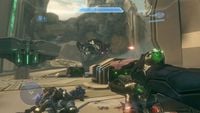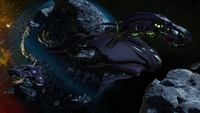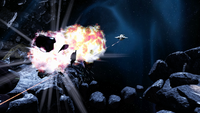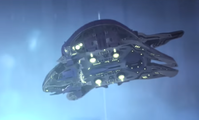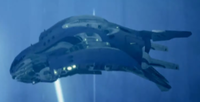Ru'swum-pattern Phantom
From Halopedia, the Halo wiki
| Ru'swum-pattern Warrior Transport | |
|---|---|
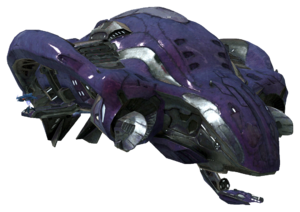
| |
| Production information | |
|
Manufacturer: |
|
|
Class: |
|
|
Role: |
|
| Technical specifications | |
|
Length: |
|
|
Width: |
|
|
Height: |
|
|
Mass: |
181.1 metric tons (178.2 LT; 199.6 ST)[1] |
|
Engine(s): |
Twin impulse drive system[4][6] |
|
Other system(s): |
|
|
Armament: |
|
|
Complement: |
|
|
Crew: |
|
| Chronological and affiliation | |
|
Era: |
|
|
Introduced: |
|
|
Affiliation: |
|
The Ru'swum-pattern Warrior Transport,[1] commonly known as the Phantom, is a Covenant dropship and gunship in service with the Covenant and its successors.[6]
Specifications
Design details
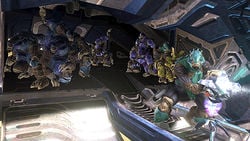
The Ru'swum-pattern Phantom was common among the Covenant fleets associated with the hierarch decrees.[1] Currently the most common version of the Phantom,[6] it was quite so popular that several variants with exotic weapons systems, shield components, and even bvearching tools, were crafted to facilitate all possible operational needs.[1] Its prominence was due to its speed, maneuverability, and firepower in atmospheric and exoatmospheric environments. It was favored by the Covenant for its armor's resilience in numerous environmental conditions. Due to these beneficial factors, the Ru'swum-pattern Phantom became one of the most significant vehicles deployed by the Covenant during assaults or occupations of hostile sites.[2] Despite the strength of its armor, the UNSC's G79H-TC Pelican was capable of besting a Ru'swum-pattern Phantom in combat.[13]
Armament
Although Phantoms are rarely deployed in a gunship role, they are equipped with a large armament.[14] The Phanton's reasonably distributed firepower was another reason for its prominence. Its primary armament is one single Type-44 Directed Energy Weapon/M plasma autocannon located underneath its nose and twin and its side-mounted secondary armament is two Pek-pattern plasma cannons attached to the dropship’s open bay doors,[2] which allow gunners to swiftly clear the deployment zones.[1]
Crew and complement
The Phantom crew consists of a pilot, a weapon officer,[2] and two gunners who are both in charge of two plamsa cannons,[1] which are typically Unggoy troops.[3][15] The Ru'swum-pattern Phantom's payload capacity is similar to that of the Kez'katu-pattern as it can transport twenty-four (up to thirty)[14] soldier "standard" passengers,[1] and at least two Type-26 Banshees or Karo'etba-pattern Ghosts, or just one Zurdo-pattern Wraith,[3] as well as essential equipment such as deployable lookout towers, and components of anti-aircraft batteries by utilizing its gravity lift.[16][17] While passengers are generally deployed from the ventral gravity lift and from the doors located by either of the dropship's large side doors, Mgalekgolo soldiers due to their size are deployed from the Phantom through the use of its gravity lift.[16][17] They have also been seen to transport teams of Huragok, which are carried in cases and swing from the Phantom's underside.[18]
Usage
Although the Ru'swum-pattern Phantom were less freqeuntly used since the much earlier stages of the Human-Covenant War, such as during Battle of Alpha Corvi II[19] and Harvest campaign,[20] its most prominent use was during the final engagements, including the Fall of Reach and Battle for Earth.[1] In the last year of the Human-Covenant War, it was largely supplanted by a newer pattern, the Kez'katu-pattern Phantom, though many Covenant troops never used the newer model.[6] After the war, disparate Covenant remnants,[2] such as Jul 'Mdama's Covenant, used the Ru'swum-pattern as their primary dropship, due to the scarcity of the Kez'katu-pattern after High Charity's destruction.[6] Although warring Sangheili factions has made extensive use of the Ru'swum-pattern Phantom, the UNSC also captured a large number of these vehicles during the Requiem Campaign.[6] The Mikpramu-pattern Phantom would later be seen in widespread use by Covenant factions and Swords of Sanghelios due to diminishing numbers of Ru'swum-pattern and Kez'katu-pattern Phantoms.[6]
The Banished salvaged and modified their Ru'swum-pattern Phantoms,[21] then designed to serve as gunships and firing platforms.[22]
UNSC designations
- Type-44 Troop Carrier - Ru'swum-pattern Phantoms used by Jul 'Mdama's Covenant during the Requiem campaigns.[4]
- Type-52 Troop Carrier - Ru'swum-pattern Phantoms used by Covenant forces during the Fall of Reach and Battle of Installation 00. Shares the designation with the Kez'batu-pattern Phantom.[16][17]
Variants
- Phantom ship breacher – Several Ru'swum-pattern Phantoms deployed by Jul' Mdama's Covenant were additionally equipped with a long boarding umbilical that can be extended from the dropship to connect to the hull or glass windows of another vessel, allowing the Phantom to fulfill a role that is somewhat similar to that of the R'sisho-pattern Tick and Brhi Xur-pattern Leech. Once the umbilical forms a connection with a vessel, it will breach the material, depressurizing the room that is being breached until a rapidly deployed force field seals the breach.[23]
Cannon configurations
Several other models of Phantoms with cannon configurations exist, although they are essentially the same in both design and function. The troop capacity and armament of a Phantom varies depending on its model.[14]
- Semi-automatic cannon configuration – These Phantoms are armed with a heavy plasma cannon that has a slow rate of fire but an explosive effect upon impact, similar to a Elo'Nakada-pattern concussion rifle.[15] They were extensively deployed during the Fall of Reach and later during the Battle of Installation 04.[24]
- Automatic cannon configuration – These Phantoms are armed with a fully automatic heavy plasma cannon that has a faster rate of fire than that of a Phantom armed with a semi-automatic cannon but a less explosive effect upon impact, and they fire blue-colored shots, unlike other Phantom models. They were prominently used by the Prophet of Truth's forces and also by the Fleet of Sacred Consecration during the Battle for Earth and later the Battle of Installation 00.[8]
Several Phantom gunships during conflicts for Requiem were armed with a heavy plasma cannon that fires unusually fast, possibly for balance against vehicles.[13][25]
Retribution Phantom
The Fleet of Retribution used customized Phantoms following the Great Schism.[26] These Phantoms were similar in function and appearance to the "normal" Phantom model, but they were colored an iridescent green instead of the usual purple,[16][17] likely to match the UNSC's vehicle color schemes shortly after allying with humanity against the Jiralhanae-led Covenant during the Battle for Earth and Battle of Installation 00. These Phantoms were equipped also with cloaking technology, something rarely seen on ships of their size.[27] After the Covenant's defeat, Mikpramu-pattern Phantoms were used instead and the green color was replaced with a red color to match the color scheme of Swords of Sanghelios infantry.[28] By 2558, at least one green-colored Phantom was used by Kig-Yar pirates on Ven III, which may indicate that this dropship may be a original Phantom used by the Fleet of Retribution and have been fallen into Kig-Yar pirates' hands.[29]
Gameplay
In Halo 3, Halo 3: ODST, Halo: Reach, and Halo 4 the Phantom's three guns, the side doors and platforms, the engine plates, and its hind flaps, as well as its entire well being, are destructible, unlike the Kez'katu-pattern Phantom in Halo 2. The Phantom's rear is most susceptible to damage, although this weakness was removed in Halo: Reach. When destroyed in Halo 3 and Halo 3: ODST, the Phantom will float down, emit sparks and a loud whirring noise, then explode into wreckage, although in Halo: Reach and Halo 4 the Phantom simply explodes.
Tactics
- Taking down a Phantom is tempting to do so in Firefight or Campaign; however, it is unwise to do so if there are Phantoms traveling in groups, as they might pin you down with their plasma guns or in the most extreme cases, kill you.
- It is recommended to destroy the Phantom's armaments before taking it out, otherwise they may pin you down.
- If possible, stay under the Phantom and shoot at the drop-off zone where Covenant jump off. You can get a few easy kills with that. However, be wary of the plasma guns.
- Use a heavy weapon to destroy a Phantom. A Spartan Laser, the Warthog's LAAV guns, or a Rocket Launcher or a Fuel Rod Gun will do the trick.
- With heavy weapons like the Rocket Launcher or a Spartan Laser as well as mounted vehicle weapons like the Scorpion tank's cannon or an M68 Gauss Cannon.
- Aim for the twin engines (the silver parts on its front), as those are its weak points. However, the weak points are removed as of Halo: Reach.
Changes
Changes from the Kez'katu-pattern Phantom in Halo 2 to Halo 3
- The Phantom is now destructible, vulnerable to heavy weapons and explosives. Nevertheless, it is very durable and able to take up to six shots from a Scorpion tank.
- The Phantom's hull is now a medium-dark violet in Halo 3, rather than magenta as it is in Halo 2.
- The Phantom's flight noise has been reduced from a loud buzzing to a low hum but the overall tone is pretty much the same.
- The Phantom fires shots that are now a blue color, rather than a vivid red.
- The Phantom can deliver troops by opening side doors, not just by the gravity lift.
- The Phantom no longer has three separate auto-cannons - they now have one chin-mounted auto-cannon, and two Type-52 Plasma Cannons on either side of the troop bay.
- The troop bay is open on both sides where the plasma turrets are and it is fully accessible by the player as they can leap into it before it takes off. The player is usually killed when the Phantom hits a death barrier.
- The main cannon's rate of fire is slower.
- The two upper tail-like parts in the rear of the Phantom appear smaller.
- A green-colored variant is introduced. The Fleet of Retribution variant is used by the Elites and has the ability to camouflage itself.
Changes from Halo 3 to Halo 3: ODST
- The wreckage from its destruction is smaller to compensate for the Xbox 360's hardware capabilities.
- The Phantom can carry Engineers in pod-like cases.
- The Phantom's main cannon is equipped with a searchlight for night missions.
Changes from Halo 3 to Halo: Reach
- The auto-cannon is replaced by a cannon that has a slower rate of fire and has a more explosive effect upon impact, similar to a Elo'Nakada-pattern concussion rifle.
- The two front engine turbines no longer glow blue.
- There are no longer any "weak points"; it takes the same amount of weapons fire to destroy regardless of hit location.
- When hit by weapons fire, it no longer takes visible damage aside from the chin and side guns being knocked off.
- When destroyed, instead of having an "overload" phase where it drops and then explodes, the targeted Phantom instantly explodes as soon as it takes enough damage.
- Far less debris is left behind when destroyed; only the debris from the chin gun, the Type-52 Plasma Cannons on the sides, and a portion of the cockpit will be left when it explodes. Furthermore, not all Phantoms encountered are destructible.
- The Phantom has more health, capable of withstanding up to five M808C Scorpion shots before exploding.
- A variant outfitted for space combat, called the R'shwupa-pattern Phantom, is introduced.
Production notes
 This section needs expansion. You can help Halopedia by expanding it.
This section needs expansion. You can help Halopedia by expanding it.
Trivia

|
Browse more images in this article's gallery page. |
- In the trailer for Halo 3: ODST, a Phantom is seen on patrol using two bright searchlights to sweep the streets. Oddly, the lights are located in the exact location as the Phantom's chin-mounted gun, possibly meaning that this Phantom was specifically adapted for patrol or that its gun had a headlight mounted alongside it. In the cutscene where the Rookie receives a transmission from Dare, the Phantom that passes by has a searchlight mounted on the front turret. This headlight feature also appears in Halo: Reach.
- In Halo: Reach's Firefight mode, a well-aimed M41 rocket launcher shot to the Phantom's cockpit can blast out the pilot (a Grunt), killing it and sending it spiraling out of the vehicle. When this happens, the Phantom stops and hovers for a few seconds before falling to the ground. Any personnel that are within the Phantom do not react and are not deployed.
- In the Halo Legends short film, Prototype, a Phantom is seen carrying a Wraith inside its troop bay, as opposed to hovering below it. This may be a means to protect the Wraith from being destroyed before it is deployed or it could simply be an oversight made by the artists.
- In Halo: Reach, a player can pilot a Phantom through the Flyable Pelican and Phantom easter egg. Unlike the Pelican, it can be destroyed, though unlike other vehicles it shows no outward indication of damage.
- In Halo: Reach's Firefight mode, the Phantom cannot be destroyed.
- During the level Composer, in the hangar, if the player activates the barrier while a Phantom is still inside the station, the vehicle will explode once it comes in contact with the barrier.
- In Halo 4, if the player tries to board a Phantom or drop pod, they will fall through the floor. This is probably because the floor is not programmed to be walked on.
- In Halo 4, if the two plasma gunners and the main gun are destroyed, the Phantom is usually destroyed. This can be seen on the Spartan Ops mission Science Mountain, by shooting the red arrows on the Phantoms with a Scorpion, however in missions such as The VIP the guns can be blown off without affecting for the most part the dropship or its occupants.
- According to Lieutenant TJ Murphy in Escape Plan, it is not hard to hijack a Phantom. Utilizing a Covenant console in "Lockup," Miller proved to be able to hack the security systems on one of the dropships and bring it under his control in just a few minutes time.
- Some phantoms, particularly those on Shutdown and Shootout in Valhalla, fire unusually fast, possibly for balance against vehicles.
Gallery
Artwork
An armada of Phantoms leaving Ariel shortly after Operation: FIRESIDE.
Ru'swum-pattern Phantoms during the Battle of Oban in Halo: Escalation.
A Ru'swum-pattern Phantom firing its heavy plasma cannon during the Battle of Alpha Corvi II.
Ru'swum-pattern Phantoms flying over the The Golden City on High Charity in the Halo Encyclopedia (2022 edition).
Halo 5: Guardians concept art depicting a Ru'swum-pattern Phantom at a seaside structure, used to represent Qikost in the Halo Encyclopedia (2022 edition).
Renders
A view of the Phantom as it appears in Halo 3.
Turnaround reference of the Phantom as it appears in Halo: Reach.
Alternate render of the Ru'swum-pattern Phantom for Halo 4.
Screenshots
A Phantom escorted by two Banshees on Installation 00 in Halo 3.
A Fleet of Retribution Phantom activating its active camouflage.
A Phantom, seen through the "eyes" of the Superintendent, using a pair of high-intensity searchlights to sweep the ruined streets of New Mombasa in Halo 3: ODST.
Ru'swum-pattern Phantoms picking up numerous Unggoy troops inside Sanctity of Purification's hangar bay. Note them being somewhat larger by comparing to Banshees and Covenant soldiers.
A view of the Phantom in Halo: Reach, on the level Nightfall.
A Phantom being teleported onto the Viery Territory.
A Phantom participating at the Battle of Asźod.
Phantom and Banshee squadrons head to the crash site of UNSC Infinity.
A Phantom near Sniper Alley.
Jul 'Mdama near a "parked" Phantom.
A Kmiro'sish-pattern Lich with two Ru'swum-pattern Phantoms on Impact in Halo: The Master Chief Collection.
A Ru'swum-pattern Phantom being destroyed by a G79H-TC Pelican.
A Ru'swum-pattern Phantom just before being destroyed by a fuel rod shot during the Unggoy Rebellion in Halo: The Master Chief Collection terminal trailer.
A Ru'swum-pattern Phantom over High Charity during the Unggoy Rebellion.
List of appearances
- Halo: Uprising (First appearance)
- Halo 3
- Halo Wars: Genesis
- Halo: Helljumper
- Halo Legends
- Halo 3: ODST
- Halo: Reach
- Halo: Fall of Reach
- Halo 4
- Halo: Spartan Assault
- Halo: Escalation
- Halo 2: Anniversary
- Halo: New Blood (Mentioned only)
- Halo: Ground Command
- Halo Mythos: A Guide to the Story of Halo
- Halo: Tales from Slipspace
- Halo: Collateral Damage
- Halo: Fireteam Raven
- Halo: Shadows of Reach
- Halo: Divine Wind
Sources
- ^ Jump up to: a b c d e f g h i j k l m n o p q r s t Halo Encyclopedia (2022 edition), page 282
- ^ Jump up to: a b c d e f g h i j k l Halo Waypoint, Halo 4 Interactive Guide - Vehicles: Phantom (Retrieved on May 1, 2013) [local archive] [external archive]
- ^ Jump up to: a b c d e f g h i j Halo 4, In-game unit
- ^ Jump up to: a b c d e Halo 4: The Essential Visual Guide, page 118
- ^ Facebook, Halo Ground Command Covenant Phantom (Retrieved on Aug 21, 2021) [archive]
- ^ Jump up to: a b c d e f g Halo Waypoint, Phantom (Retrieved on Oct 30, 2021) [archive]
- ^ Jump up to: a b Halo 2: Anniversary, Terminal 10
- ^ Jump up to: a b c Halo 3: campaign gameplay
- ^ Jump up to: a b Halo: Escalation, issue #1
- ^ Halo: Tales from Slipspace - Knight Takes Bishop
- ^ Halo: Spartan Assault - Operation A: Umbra, campaign level Mission 2: The Mirror Mantle Counter-Assault
- ^ Halo: Escalation, issue #2
- ^ Jump up to: a b Halo 4, campaign level Shutdown
- ^ Jump up to: a b c Halo Official Site, Phantom Halo Official Site (Retrieved on Dec 28, 2011) [archive]
- ^ Jump up to: a b Halo: Reach: campaign and multiplayer gameplay
- ^ Jump up to: a b c d Halo Encyclopedia (2009 edition), page 268
- ^ Jump up to: a b c d Halo Encyclopedia (2011 edition), page 281
- ^ Halo 3: ODST: campaign gameplay
- ^ Halo: Collateral Damage, issue #1
- ^ Halo Wars: Genesis
- ^ Twitter, Jeff Easterling (Retrieved on Dec 28, 2011) [archive]
- ^ Halo Waypoint, Canon Fodder - Know-Scope (Retrieved on Jul 1, 2017) [archive]
- ^ Halo 4, campaign level Dawn
- ^ Halo: Fireteam Raven
- ^ Halo 4 - Spartan Ops, campaign mission Catherine: Shootout In Valhalla
- ^ Halo 3, campaign level Floodgate
- ^ Halo 3, campaign level The Covenant
- ^ Halo 5: Guardians, campaign level Swords of Saghelios
- ^ Halo: Escalation, issue #12
| ||

